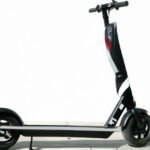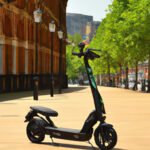
Are you wondering if you can hop on an electric scooter and start cruising around town without needing a driver’s licence? It’s a common question, especially as electric scooters become more popular as a convenient and eco-friendly mode of transportation. Well, the answer isn’t so straightforward, but don’t worry! In this article, we’ll dive into the regulations surrounding electric scooters and licences, so you can know exactly what you need to hit the road legally and safely. Stay tuned!
If you’ve been contemplating getting an electric scooter but aren’t sure about the licensing requirements, you’re in the right place. In this article, we’ll explore the rules and regulations that determine whether you can ride an electric scooter without a licence. Understanding these regulations is important, as it not only ensures that you are abiding by the law, but also helps to keep you and others safe while on the road. So, let’s delve into the world of electric scooter licensing and find out what you need to know. Keep reading to learn more! Electric scooters have become increasingly popular in recent years, providing a convenient and eco-friendly mode of transportation for short distances. However, it is essential to understand the laws and regulations regarding electric scooters before hopping on one and taking it for a spin. In this article, we will discuss the age and licensing requirements for electric scooter drivers, the potential legal consequences of driving without a license, and the benefits of driving an electric scooter. We will also explore factors to consider before driving an electric scooter without a license, safety guidelines for riders, different types of electric scooters available, maintenance and care tips, the importance of insurance, and the promotion of electric scooter safety and awareness.

Age requirements for electric scooter drivers
Before you decide to ride an electric scooter, it is crucial to understand the age requirements set by your local laws and regulations. In most countries, the minimum age for driving an electric scooter is 16 years old. However, it is essential to check with your local government or transportation authorities to ensure compliance with the specific age restrictions in your area.
Licensing requirements for electric scooter drivers
The need for a driver’s license to operate an electric scooter varies from one jurisdiction to another. In some locations, a standard driver’s license is required, while in others, a specific scooter license may be necessary. It is crucial to research and understand the licensing requirements in your area to avoid any potential legal issues.

Driving an electric scooter without a license
While it may be tempting to ride an electric scooter without a license, it is important to remember that doing so can have severe legal consequences. In many places, driving without a license is considered a violation of traffic laws and can result in fines, penalties, or even confiscation of the scooter. It is crucial to adhere to the licensing requirements set by your local authorities to ensure a safe and legal riding experience.
Potential legal consequences of driving without a license
Driving an electric scooter without a license can lead to various legal consequences, depending on the jurisdiction. Some potential penalties may include fines, points on your driving record, or even suspension of your driving privileges. It is essential to familiarize yourself with the specific laws and regulations in your area to avoid any legal trouble.

Exceptions and exemptions for driving electric scooters without a license
While the general rule is to have a license to drive an electric scooter, there may be exceptions and exemptions in certain situations. For example, some jurisdictions may allow individuals below the minimum age requirement to ride electric scooters if accompanied by a licensed adult. Additionally, individuals with disabilities may be exempt from the licensing requirements and be permitted to ride electric scooters. It is crucial to consult your local transportation authorities to determine if any exceptions or exemptions apply to your situation.
Benefits of driving an electric scooter
Driving an electric scooter offers several advantages, making it an attractive mode of transportation for many individuals. Let’s explore some of the benefits below:
Eco-friendly transportation option
Electric scooters run on electricity, making them a greener alternative to conventional vehicles that rely on fossil fuels. By choosing to ride an electric scooter, you are actively contributing to reducing air pollution and carbon emissions, ultimately helping to create a cleaner and healthier environment.
Cost-effective mode of travel
Electric scooters are more cost-effective compared to traditional vehicles. They consume less energy and require minimal maintenance, resulting in reduced expenses for fuel, insurance, and servicing. Additionally, the cost of purchasing an electric scooter is often significantly lower than that of a car or motorcycle, making it a more affordable option for many individuals.
Convenient and efficient for short distances
Electric scooters are designed specifically for short-distance travel, making them a convenient mode of transportation for running errands, commuting to work, or exploring your neighborhood. With their compact size, electric scooters can easily navigate through congested areas and find parking spaces, eliminating the stress often associated with finding parking for larger vehicles.

Factors to consider before driving an electric scooter without a license
While it may be tempting to ride an electric scooter without a license, several factors should be considered before doing so. These factors include understanding local laws and regulations, as well as adopting safety precautions and obtaining proper training.
Understanding local laws and regulations
Before riding an electric scooter without a license, it is crucial to familiarize yourself with the specific laws and regulations in your area. Different jurisdictions may have varying age requirements, licensing requirements, and restrictions regarding where electric scooters can be ridden. By understanding and complying with these laws, you can ensure a safe and enjoyable riding experience.
Safety precautions and training
Driving an electric scooter requires a certain level of skill and knowledge. It is essential to take the time to learn the basics of operating an electric scooter, including how to accelerate, brake, and maneuver safely. Additionally, wearing appropriate safety gear, such as a helmet, knee pads, and elbow pads, is essential to protect yourself in the event of an accident. By taking these safety precautions and obtaining proper training, you can minimize the risk of accidents and injuries while riding an electric scooter.
Safety guidelines for electric scooter riders
Ensuring your safety and the safety of others should always be a top priority when riding an electric scooter. The following safety guidelines can help you enjoy a safe and pleasant riding experience:
Wearing appropriate safety gear
To protect yourself from potential injuries, it is crucial to wear the appropriate safety gear. This includes a helmet to protect your head, knee pads and elbow pads for added protection, and closed-toe shoes to provide stability and support while riding. Wearing bright or reflective clothing can also enhance your visibility to other road users, especially during nighttime rides.
Adhering to traffic rules and signals
As an electric scooter rider, it is essential to follow all traffic rules and signals, just like any other road user. This includes stopping at red lights and stop signs, yielding to pedestrians, and using hand signals to indicate your intentions. By understanding and obeying traffic rules, you can ensure your safety and the safety of others sharing the road with you.
Awareness of surroundings and potential hazards
Maintaining awareness of your surroundings is crucial when riding an electric scooter. Always scan the road ahead for potential hazards, such as potholes, debris, or other obstacles. Additionally, be mindful of other road users, including pedestrians, cyclists, and motorists, and anticipate their actions to avoid any potential collisions. By staying alert and attentive, you can react quickly to any unexpected situations and ensure a safe riding experience.

Different types of electric scooters available
Electric scooters come in various types, each designed to cater to different riding preferences and terrains. Understanding the different types of electric scooters can help you choose the one that best suits your needs. Here are some common types of electric scooters:
Foldable electric scooters
Foldable electric scooters are lightweight and compact, making them easy to carry and store. They are often popular among commuters due to their portability and convenience. Foldable electric scooters typically have a shorter range and lower top speed compared to other types, but they are ideal for short-distance travel.
Off-road electric scooters
Off-road electric scooters are designed for rugged terrains and rough surfaces. They feature larger tires with extra traction, enhanced suspension systems, and more powerful motors to navigate uneven surfaces with ease. These scooters are suitable for individuals who enjoy off-road adventures and exploring nature trails.
City/commuter electric scooters
City or commuter electric scooters are designed for urban environments and daily commuting. They offer a comfortable and smooth ride, with features such as larger wheels, better suspension, and longer battery life. City electric scooters are often equipped with additional features such as headlights, taillights, and turn signals to ensure visibility and safety in busy city streets.
Maintenance and care for electric scooters
Proper maintenance and care are essential to keep your electric scooter in good working condition and ensure a safe and enjoyable riding experience. Here are some maintenance tips to keep in mind:
Regular battery charging and replacement
To ensure optimal performance, it is important to charge your electric scooter’s battery regularly. Follow the manufacturer’s instructions for charging time and avoid overcharging, as it can shorten the battery’s lifespan. When necessary, replace the battery with a new one that meets the specifications provided by the manufacturer.
Cleaning and upkeep of the scooter
Regular cleaning of your electric scooter is necessary to remove dirt, dust, and debris that can accumulate over time. Use a damp cloth or sponge to wipe down the scooter’s surfaces, including the handlebars, deck, and wheels. Avoid using harsh chemicals or solvents that may damage the scooter’s components.
Ensuring proper tire pressure and brake functionality
Maintaining the correct tire pressure is crucial for the scooter’s safety and performance. Check the tire pressure regularly using a reliable pressure gauge and inflate or deflate the tires as needed. Additionally, ensure that the brakes are in good working condition and inspect them regularly for any signs of wear or damage. If the brakes are worn or not functioning correctly, seek professional assistance to have them repaired or replaced.
Insurance for electric scooters
While not always required by law, having insurance for your electric scooter is highly recommended. Here are some reasons why:
Importance of insuring your electric scooter
Electric scooters are susceptible to theft, accidents, and damages just like any other mode of transportation. Insurance provides financial protection in case of theft, damage to your scooter, or liability for any injuries or property damage caused to others while riding. Having insurance gives you peace of mind and helps you avoid potential financial burdens.
Types of insurance coverage available
Several types of insurance coverage are available for electric scooters, including comprehensive insurance, liability insurance, and personal injury protection. Comprehensive insurance covers damages to your scooter caused by theft, fire, or accidents. Liability insurance protects you in case of liability claims for injuries or property damage caused to others. Personal injury protection covers medical expenses for injuries sustained while riding your electric scooter.
Promoting electric scooter safety and awareness
To promote the safe and responsible use of electric scooters, various educational campaigns and initiatives have been launched. These initiatives aim to raise awareness about the importance of following traffic rules, wearing safety gear, and respecting other road users. Additionally, collaboration with local authorities and communities can help create designated lanes or areas for electric scooter riders, further ensuring their safety and integration into the transportation system.
Conclusion
In conclusion, driving an electric scooter without a license may have legal consequences, but by understanding local laws and safety guidelines, you can ensure a safe and enjoyable riding experience. It is important to comply with age and licensing requirements, wear appropriate safety gear, and adhere to traffic rules and signals. Electric scooters offer several benefits, including eco-friendly transportation, cost-effectiveness, and convenience. However, it is essential to consider factors such as local laws, safety precautions, and maintenance before riding an electric scooter. By taking these factors into account and promoting electric scooter safety and awareness, we can all contribute to a safer and more sustainable mode of transportation.






















